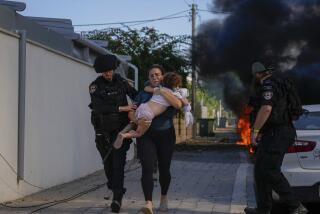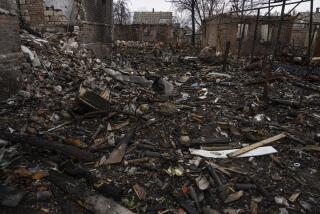War Crime Sites Must Be Accessible : Bosnia: The U.S.-led NATO force should not abet Serb efforts to cover up the evidence of mass executions.
- Share via
The American-led Operation Joint Endeavor in Bosnia has already reached a defining moment. The issue in question is whether IFOR, the NATO peacekeeping implementation force, should make sites of alleged war crimes accessible to international investigators over the objections of the Bosnian Serbs. The unequivocal answer should be “yes, as quickly as possible.”
Last summer, aerial reconnaissance photography and eyewitness testimony pointed to mass executions of Muslim men and boys by Bosnian Serbs at several locations near Srebrenica in eastern Bosnia, now part of the U.S. sector. Earlier this month, credible evidence was made public that the Bosnian Serbs are using a large open-pit mine in Lubija, in the northwestern part of the country in the British sector, to reinter the exhumed remains of thousands of murdered Croat and Muslim men, women and children after crushing their bones and treating them with acid to prevent future identification.
NATO’s response to calls by international investigators for immediate access to these and other sites has been contradictory. While U.S. Secretary of Defense William Perry has stated that IFOR would make access available, U.S. Adm. Leighton Smith, the IFOR commander, has indicated that it is, at best, low on his priority list.
Not surprisingly, the Bosnian Serbs are adamantly against any international investigations of alleged massacre and mass burial sites, at least until they can “‘sanitize” them. British troops in the immediate vicinity of Lubija have refused to impede the Bosnian Serbs’ ghoulish cover-up operation. The U.S. Joint Chiefs also are reported to be vigorously opposed to American IFOR troops opening the way for investigators, since they fear it would bring down Bosnian Serb wrath upon our GIs.
Obviously, all Americans share the desire to bring the troops home safely, but these sentiments must not become the mission’s end in itself. The goal of Operation Joint Endeavor is to create the conditions for lasting peace in Bosnia-Herzegovina, an essential element of which is uncovering the truth about war crimes. To ignore this aspect would lend credence to the lie of “‘moral equivalence,” an intellectually lazy and dishonest formulation that labels Bosnian Serbs, Croats and Muslims alike as incorrigibly quarrelsome South Slavs who persist in being unable to get along with one another.
The truth, of course, is diametrically different. The Bosnian Serb forces of warlord Radovan Karadzic and Gen. Ratko Mladic, aided by Serbia, were the aggressors in this vicious war, and the Bosnian Muslims were the principal aggrieved party.
The Dayton accord recognizes the absolute necessity of getting to the bottom of the war crimes; it calls for “unrestricted access,” not only for IFOR but also for human rights monitors and the International Tribunal for the Former Yugoslavia.
Now the Bosnian Serbs are engaging in their familiar obstructionist tactics, combined with a clever “charm offensive” toward the U.S. Army, designed to divert attention from their earlier foul deeds.
Meanwhile, as justification for stonewalling war crimes investigators, American commanders are reportedly calling for being “evenhanded” toward all parties in the Bosnian conflict. I agree: International investigators should be granted immediate access to all sites of suspected mass murders and burials, whether they are in areas currently controlled by the Bosnian Serbs, Bosnian Croats or Bosnian Muslims.
In the debate over contributing U.S. troops to IFOR, concern was frequently voiced over possible “‘mission creep.” We now see the exact opposite: a danger of “reverse mission creep” by deferring to the Bosnian Serbs, lest they be provoked into attacking our forces. By this timorous behavior we run the risk of repeating the fatal mistake of the U.N. peacekeeping mission.
This charade cannot be permitted to continue. IFOR must facilitate full access to sites of alleged war crimes, as called for in the Dayton accord, before it is too late.
More to Read
Sign up for Essential California
The most important California stories and recommendations in your inbox every morning.
You may occasionally receive promotional content from the Los Angeles Times.













